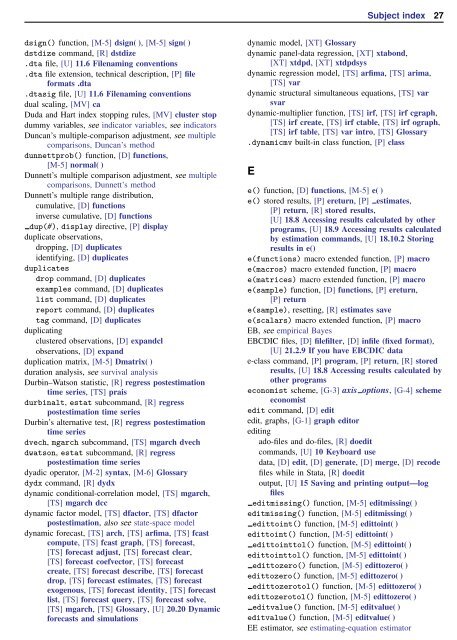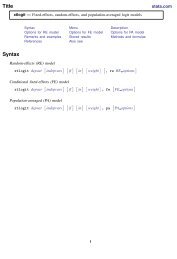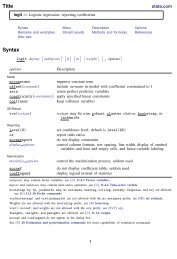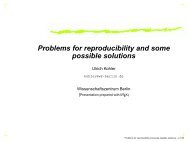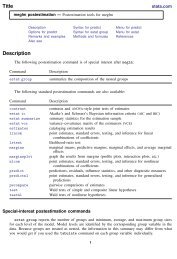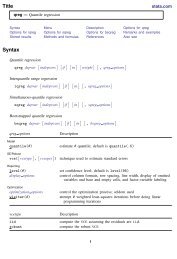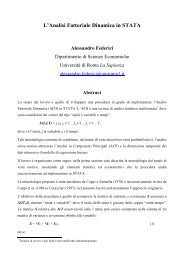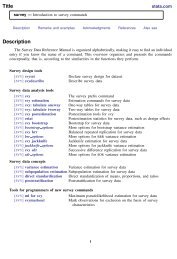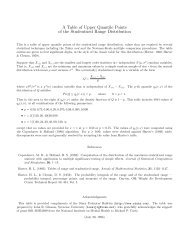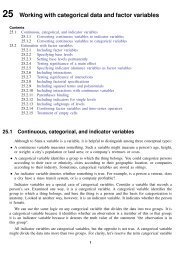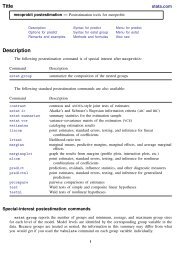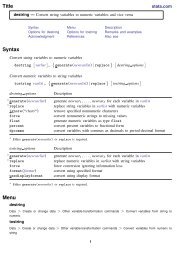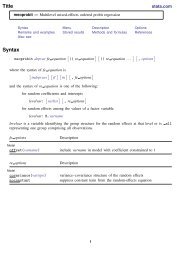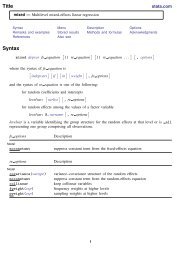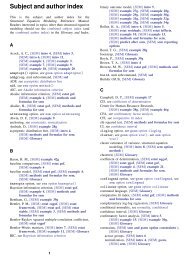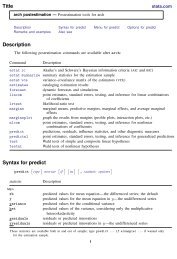Subject index - Stata
Subject index - Stata
Subject index - Stata
You also want an ePaper? Increase the reach of your titles
YUMPU automatically turns print PDFs into web optimized ePapers that Google loves.
<strong>Subject</strong> <strong>index</strong> 27<br />
dsign() function, [M-5] dsign( ), [M-5] sign( )<br />
dstdize command, [R] dstdize<br />
.dta file, [U] 11.6 Filenaming conventions<br />
.dta file extension, technical description, [P] file<br />
formats .dta<br />
.dtasig file, [U] 11.6 Filenaming conventions<br />
dual scaling, [MV] ca<br />
Duda and Hart <strong>index</strong> stopping rules, [MV] cluster stop<br />
dummy variables, see indicator variables, see indicators<br />
Duncan’s multiple-comparison adjustment, see multiple<br />
comparisons, Duncan’s method<br />
dunnettprob() function, [D] functions,<br />
[M-5] normal( )<br />
Dunnett’s multiple comparison adjustment, see multiple<br />
comparisons, Dunnett’s method<br />
Dunnett’s multiple range distribution,<br />
cumulative, [D] functions<br />
inverse cumulative, [D] functions<br />
dup(#), display directive, [P] display<br />
duplicate observations,<br />
dropping, [D] duplicates<br />
identifying, [D] duplicates<br />
duplicates<br />
drop command, [D] duplicates<br />
examples command, [D] duplicates<br />
list command, [D] duplicates<br />
report command, [D] duplicates<br />
tag command, [D] duplicates<br />
duplicating<br />
clustered observations, [D] expandcl<br />
observations, [D] expand<br />
duplication matrix, [M-5] Dmatrix( )<br />
duration analysis, see survival analysis<br />
Durbin–Watson statistic, [R] regress postestimation<br />
time series, [TS] prais<br />
durbinalt, estat subcommand, [R] regress<br />
postestimation time series<br />
Durbin’s alternative test, [R] regress postestimation<br />
time series<br />
dvech, mgarch subcommand, [TS] mgarch dvech<br />
dwatson, estat subcommand, [R] regress<br />
postestimation time series<br />
dyadic operator, [M-2] syntax, [M-6] Glossary<br />
dydx command, [R] dydx<br />
dynamic conditional-correlation model, [TS] mgarch,<br />
[TS] mgarch dcc<br />
dynamic factor model, [TS] dfactor, [TS] dfactor<br />
postestimation, also see state-space model<br />
dynamic forecast, [TS] arch, [TS] arfima, [TS] fcast<br />
compute, [TS] fcast graph, [TS] forecast,<br />
[TS] forecast adjust, [TS] forecast clear,<br />
[TS] forecast coefvector, [TS] forecast<br />
create, [TS] forecast describe, [TS] forecast<br />
drop, [TS] forecast estimates, [TS] forecast<br />
exogenous, [TS] forecast identity, [TS] forecast<br />
list, [TS] forecast query, [TS] forecast solve,<br />
[TS] mgarch, [TS] Glossary, [U] 20.20 Dynamic<br />
forecasts and simulations<br />
dynamic model, [XT] Glossary<br />
dynamic panel-data regression, [XT] xtabond,<br />
[XT] xtdpd, [XT] xtdpdsys<br />
dynamic regression model, [TS] arfima, [TS] arima,<br />
[TS] var<br />
dynamic structural simultaneous equations, [TS] var<br />
svar<br />
dynamic-multiplier function, [TS] irf, [TS] irf cgraph,<br />
[TS] irf create, [TS] irf ctable, [TS] irf ograph,<br />
[TS] irf table, [TS] var intro, [TS] Glossary<br />
.dynamicmv built-in class function, [P] class<br />
E<br />
e() function, [D] functions, [M-5] e( )<br />
e() stored results, [P] ereturn, [P] estimates,<br />
[P] return, [R] stored results,<br />
[U] 18.8 Accessing results calculated by other<br />
programs, [U] 18.9 Accessing results calculated<br />
by estimation commands, [U] 18.10.2 Storing<br />
results in e()<br />
e(functions) macro extended function, [P] macro<br />
e(macros) macro extended function, [P] macro<br />
e(matrices) macro extended function, [P] macro<br />
e(sample) function, [D] functions, [P] ereturn,<br />
[P] return<br />
e(sample), resetting, [R] estimates save<br />
e(scalars) macro extended function, [P] macro<br />
EB, see empirical Bayes<br />
EBCDIC files, [D] filefilter, [D] infile (fixed format),<br />
[U] 21.2.9 If you have EBCDIC data<br />
e-class command, [P] program, [P] return, [R] stored<br />
results, [U] 18.8 Accessing results calculated by<br />
other programs<br />
economist scheme, [G-3] axis options, [G-4] scheme<br />
economist<br />
edit command, [D] edit<br />
edit, graphs, [G-1] graph editor<br />
editing<br />
ado-files and do-files, [R] doedit<br />
commands, [U] 10 Keyboard use<br />
data, [D] edit, [D] generate, [D] merge, [D] recode<br />
files while in <strong>Stata</strong>, [R] doedit<br />
output, [U] 15 Saving and printing output—log<br />
files<br />
editmissing() function, [M-5] editmissing( )<br />
editmissing() function, [M-5] editmissing( )<br />
edittoint() function, [M-5] edittoint( )<br />
edittoint() function, [M-5] edittoint( )<br />
edittointtol() function, [M-5] edittoint( )<br />
edittointtol() function, [M-5] edittoint( )<br />
edittozero() function, [M-5] edittozero( )<br />
edittozero() function, [M-5] edittozero( )<br />
edittozerotol() function, [M-5] edittozero( )<br />
edittozerotol() function, [M-5] edittozero( )<br />
editvalue() function, [M-5] editvalue( )<br />
editvalue() function, [M-5] editvalue( )<br />
EE estimator, see estimating-equation estimator


